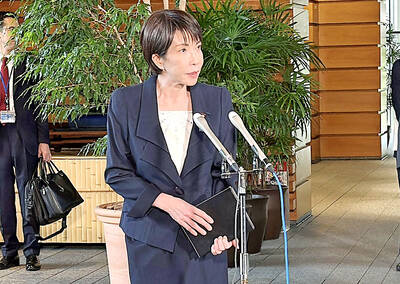The G8 wealthiest nations yesterday pledged US$60 billion to fight AIDS and malaria in Africa, and to uphold an earlier pledge to boost its development aid.
"We are aware of our responsibilities and will fulfil our obligations," German Chancellor Angela Merkel, hosting G8 leaders, told reporters on the final day of the summit.
Campaigners complain that rich nations have fallen behind on commitments made to double development aid at a summit in 2005 in Gleneagles, Scotland. Many were unimpressed with the deal.
Leaders agreed to earmark US$60 billion to fight AIDS, malaria and tuberculosis, global diseases that have devastated African peoples and their economies.
Of that US$30 billion has already been pledged by the US.
Among the pledges, the leaders made three "significant dollar commitments" to support action on mother-to-child, pediatric treatments, maternal and child health totalling US$4.8 billion.
They agreed to allow local production of drugs such as anti-retrovirals for HIV/AIDS patients to ensure cheaper prices for medication.
They also agreed to cut the prevalence of malaria in 30 African countries, which is responsible for 80 percent of deaths, cutting deaths in half.
But the declaration set out no specific timetable, saying the money would flow "over the coming years." Neither did it break down individual countries' contributions.
Campaigners for Africa say the pledge is made up largely of money which has already been announced.
"While lives will be saved with more money for AIDS, this represents a cap on ambition that will ultimately cost millions more lives," said Steve Cockburn of the Stop AIDS Campaign.
He said the pledge falls short of UN targets which oblige G8 nations to spend US$15 billion per year to combat AIDS alone through to 2010.
In comparison, the deal looks like committing them to about US$12 billion per year for all three diseases.
Leaders also reiterated an overall pledge made in 2005 to raise annual aid levels by US$50 billion by 2010, US$25 billion of which is for Africa.
"The important thing is that we have recommitted ourselves to all the commitments we made a couple of years ago," British Prime Minister Tony Blair said.
Campaigners weren't convinced.
"Despite last minute face saving measures, the G8 has failed its credibility test on Africa," said Collins Magalasi, ActionAids's country director for South Africa.
Blair and Merkel stressed they expect African leaders to fight corruption and boost transparency so donors can track aid.
Leaders of six African nations joined the G8 heads yesterday for their talks on aid.

‘MOTHER’ OF THAILAND: In her glamorous heyday in the 1960s, former Thai queen Sirikit mingled with US presidents and superstars such as Elvis Presley The year-long funeral ceremony of former Thai queen Sirikit started yesterday, with grieving royalists set to salute the procession bringing her body to lie in state at Bangkok’s Grand Palace. Members of the royal family are venerated in Thailand, treated by many as semi-divine figures, and lavished with glowing media coverage and gold-adorned portraits hanging in public spaces and private homes nationwide. Sirikit, the mother of Thai King Vajiralongkorn and widow of the nation’s longest-reigning monarch, died late on Friday at the age of 93. Black-and-white tributes to the royal matriarch are being beamed onto towering digital advertizing billboards, on

Indonesia was to sign an agreement to repatriate two British nationals, including a grandmother languishing on death row for drug-related crimes, an Indonesian government source said yesterday. “The practical arrangement will be signed today. The transfer will be done immediately after the technical side of the transfer is agreed,” the source said, identifying Lindsay Sandiford and 35-year-old Shahab Shahabadi as the people being transferred. Sandiford, a grandmother, was sentenced to death on the island of Bali in 2013 after she was convicted of trafficking drugs. Customs officers found cocaine worth an estimated US$2.14 million hidden in a false bottom in Sandiford’s suitcase when

POWER ABUSE WORRY: Some people warned that the broad language of the treaty could lead to overreach by authorities and enable the repression of government critics Countries signed their first UN treaty targeting cybercrime in Hanoi yesterday, despite opposition from an unlikely band of tech companies and rights groups warning of expanded state surveillance. The new global legal framework aims to bolster international cooperation to fight digital crimes, from child pornography to transnational cyberscams and money laundering. More than 60 countries signed the declaration, which means it would go into force once ratified by those states. UN Secretary-General Antonio Guterres described the signing as an “important milestone,” and that it was “only the beginning.” “Every day, sophisticated scams destroy families, steal migrants and drain billions of dollars from our economy...

PRESSURE: Trump is expected to demand that Tokyo raise its defense spending, but Japan’s new foreign minister said the amount is less important than how it is spent Japan plans to show its determination to further build up its defense to rapidly adapt to changing warfare realities and growing tension in the region when US President Donald Trump visits Tokyo next week, Minister of Foreign Affairs Toshimitsu Motegi said. Japanese Prime Minister Sanae Takaichi’s administration is also finalizing a purchase package, including US pickups, soybeans and gas, to present to Trump, but would not commit to any new defense spending target at the meeting, a source with knowledge of the preparations said. The two leaders are to sit down in Tokyo on Monday and Tuesday next week during Trump’s first